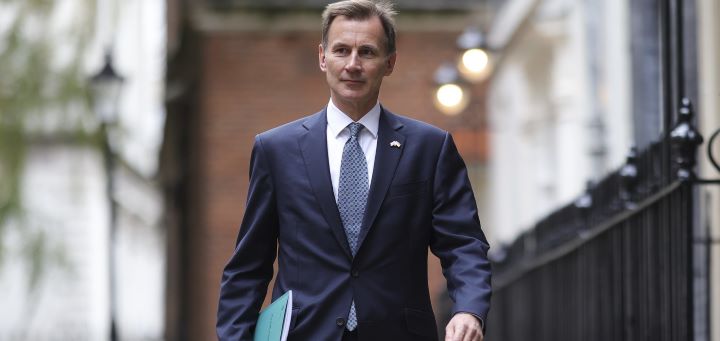
Chancellor Jeremy Hunt’s Autumn Statement, which introduced additional funding for social care and a delay to charging reforms, has been described by local government finance leaders as “better than expected”.
In his statement to the House of Commons on 17 November, Hunt promised to prioritise “stability, growth and public services”. He chose to address inflationary pressures facing local authorities by committing up to £2.8bn of additional funding for adult social care in 2023/24 and £4.7bn for the following year.
Hunt also announced a delay to the social care charging reforms from October 2023 to October 2025. Funding for implementation of the reforms will be maintained to enable councils to address current adult social care pressures.
In response to the Autumn Statement, Chris Tambini, president of the Society of County Treasurers and director of corporate resources at Leicestershire County Council, told Room151: “The position is better than expected, and, compared to other parts of the public sector, local government has fared well. Especially welcome is the extra funding for adult social care and deferring the adult social care reforms.”
Tambini’s sentiment was echoed by Tim Oliver, chairman of the County Councils Network (CCN), who called the delay to social care reforms a “brave decision, but completely the right one”.
He said: “We understand that many will be disappointed, but postponing these reforms and reinvesting significant additional funding into frontline care services is strongly welcomed and will protect the most vulnerable in our society as well as buy councils vital time to stabilise the care system.”
Whether this extra funding can be distributed in a fair way that meets levelling up ambitions remains to be seen. It should give Michael Gove some headroom to equalise the impact that sees councils with high needs and low taxbases, mainly in the North, receive much less from council tax increases.
Council tax ‘flexibilities’
The chancellor also promised increased “flexibilities” on council tax. Local authorities will be able to increase council tax by up to 3% per year from April 2023 without a referendum, with councils that have social care responsibilities able to increase their council tax by an additional 2% per year. Currently, the overall cap is set at 2.99%.
According to Dan Bates, director at consultancy LGi, local government budget gaps were reported to be about £3.5bn prior to the Autumn Statement. “I’d expect the additional £2.8bn for social care and a modest 1% increase in the council tax referendum limit to be cautiously welcomed by councils,” he told Room151.
“Whether this extra funding can be distributed in a fair way that meets levelling up ambitions remains to be seen. It should give [levelling up secretary] Michael Gove some headroom to equalise the impact that sees councils with high needs and low taxbases, mainly in the North, receive much less from council tax increases.”
Hunt’s announcement on tax flexibilities has been criticised by a range of council leaders. Sir Stephen Houghton, chair of the body representing municipal authorities SIGOMA , said: “Reliance on council tax to fairly fund care and other services is the wrong choice – it raises funding in a way unrelated to need while the increases ‘allowed’ will not come close to the funding gap and will put more pressures on family budgets when they can least afford it.”
Tambini added: “Most income sources including council tax will be lower in real terms in 2023/24 and that is on top of significant real terms cut in spending power this year.
“It has also left local politicians of upper-tier councils with the difficult decision of whether to put up council tax by 5% in the middle of a cost-of-living crises with the largest falls in disposable income on record.”
It is welcome that investment zones will be re-prioritised toward ‘left-behind’ areas, but the fact that the original expressions of interest will not be taken forward is just the latest example of the flaws of competitive bidding and the overcentralisation of local government funding pots.
Devolution ‘milestone’
In his statement, Hunt confirmed the second round of the Levelling Up Fund, which will allocate at least £1.7bn to priority local infrastructure projects. He also announced a new elected mayor in Suffolk and new devolution deals for Cornwall, Norfolk and “an area in the North East”.
Cllr Martin Hill, the CCN’s devolution spokesperson, said: “The announcement today that the devolution deal in Suffolk is complete, with those in Cornwall and Norfolk close to completion, is another milestone in the county devolution agenda.
“All three agreements could be genuinely transformative for their local areas, with the Suffolk devolution deal the first of its kind in putting forward a directly-elected county leadership model.”
However, Hunt decided to “refocus” Liz Truss’ investment zones programme by “leveraging our research strengths by being centred on universities”.
Houghton said: “It is welcome that investment zones will be re-prioritised toward ‘left-behind’ areas, but the fact that the original expressions of interest will not be taken forward is just the latest example of the flaws of competitive bidding and the overcentralisation of local government funding pots.”
Hunt also announced that the government will provide £1bn to enable the extension of the Household Support Fund in England over 2023/24.
—————
FREE weekly newsletters
Subscribe to Room151 Newsletters
Room151 LinkedIn Community
Join here
Monthly Online Treasury Briefing
Sign up here with a .gov.uk email address
Room151 Webinars
Visit the Room151 channel













